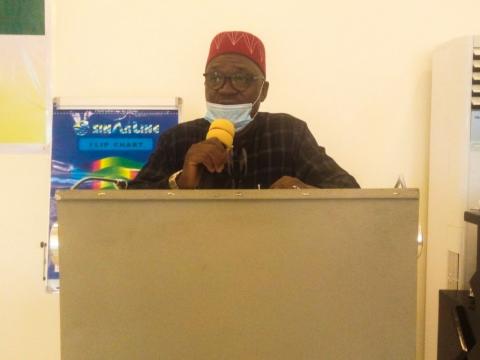By Mabinty M. Kamara
Dr. Adamu Mohamed Sani, Programs Officer, Disarmament and Arms Control and Security of the ECOWAS Commission, has cited porous borders as a challenge to the control of the importation and transfer of small arms across the sub region.
Dr. Sani made this statement during the opening session of a training on the exemption procedures to the Economic Community for West Africa States (ECOWAS) Convention on Small Arms and Light Weapons in Freetown, citing a study conducted by the ECOWAS Commission.
He said porous and long boarders on land and sea, imported arms, local artisanal production, licit and illicit, lack of capacities of security personnel and the easy movement of goods across borders, were issues that continue to make the sub-region vulnerable.
In attendance at the training were personnel from the Office of National Security (ONS, the Republic of Sierra Leone Armed Forces (RSLAF), the Sierra Leone Correctional Service, customs and border security officers and the Sierra Leone Police, among others.
According to Dr. Sani, the capacity building training is geared towards deepening the understanding of security apparatus about the ECOWAS Exemption process.
“The ECOWAS’s policy on arms transfer is fully embedded in the ECOWAS exemption process. And this is one of the key provisions of the ECOWAS Convention on small Arms and large weapons and ammunitions and other related materials. It’s a legally binding instrument that came into force in 2009,” he said.
He went on to explain the exemption policy in the convention, noting that all the ECOWAS member states are parties to the convention and that Article 3 of the convention prohibits the exportation of small arms into the region by all the member states.
“But article 4 has given them the leeway in terms of specific conditions and the conditions are three: One, if a member state is having a legitimate security need, then the application shall be transmitted into commission; Secondly, if a country, for instance Sierra Leone, is deployed for peace keeping operations, it may need the equipment, and military wear that will allow you move your contingent to the mission area; Thirdly, if an internal issue is happening in the country, like uprising,” he narrated, adding: “These are major issues that a country meets for the exemption to be granted and certificate of exemption will be given to the member states.”
Dr Sani went on: “So we are here to provide capacity building support to the armed forces of Sierra Leone, so that they can effectively also understand the process, because over time, we have had issues related to the understanding of the documentations.
The ECOWAS Commission official said a lot of these member states have not been able to put the documentations together for the exemption to be issued. He said they therefore decided to give a two day in-country support to member states, in the goal of understanding the current threats of small arms proliferations in our regions.
“We all know the emerging crisis, the emerging problems. So this support is part of the wider support by ECOWAS to be able to see that peace and security reign in our region,” he said.
Dr Sani said that Sierra Leone has so far been compliant with the requirements of the convention.
In his statement, Brigadier General (Rtd), Tamba R. Allieu, Commissioner at the Sierra Leone National Small Arms Commission, noted that the two days training will be climaxed by a handing over ceremony of equipment to the personnel.
“The handing over ceremony is about equipment received from ECOWAS since June on physical security and stock pile management of small arms and light weapons. So we decided that since ECOWAS is here, we can present it to the end users which will be the police and the Republic of Sierra Leone Armed Forces,” he said.
Copyright © 2020 Politico Online








